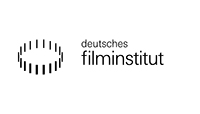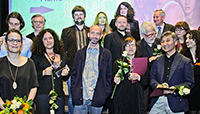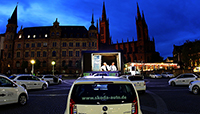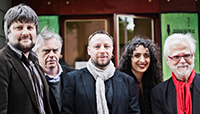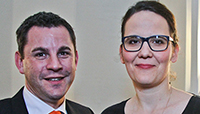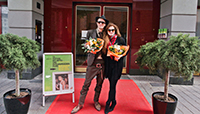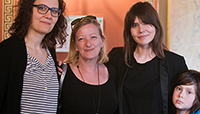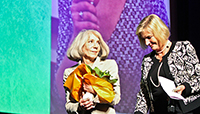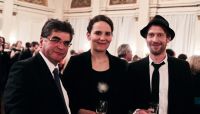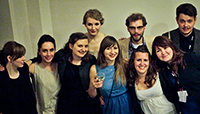
COLOURFUL, BIZARRE, PRECISE: CINEMA FROM EASTERN EUROPE
goEast – Festival of Central and Eastern European Film begins at 19.00 on Wednesday, 28 March with the ceremonial opening by Udo Corts, Hessen State Minister of Higher Education, Research and the Arts, and Rita Thies, Head of the Wiesbaden Department of Education and Cultural Affairs, at the Caligari cinema in Wiesbaden. A programme of short films will launch the festival.
With one world premiere, two international premieres, and a large number of first German screenings, the goEast audience can look forward to a highly exciting Competition. Among the ten features and six documentaries selected for competition are several debut films, such as FRISS LEVEGŐ / FRESH AIR, the colourful Gesamtkunstwerk by Hungarian director Ágnes Kocsis, and EUPHORIA by Ivan Vyrypaev, a Russian director so far noted for his work in the theatre. After its success in Estonia, the comedy 186 KILOMETER / 186 KILOMETRES by Andres Maimik and Rain Tolk is receiving its international premiere at goEast. With ARMIN (dir: Ognjen Sviličić) and KLOPKA / THE TRAP (dir: Srdan Golubović), two competition films from ex-Yugoslavia testify to the emergence of a new generation of directors who deliver precise societal descriptions far removed from the hackneyed Balkan clichés. In the fast-paced ĶĪLNIEKS / THE HOSTAGE, Laila Pakalniņa effortlessly deconstructs both the thriller genre and a number of sacred national institutions. For barbed allusions to society, the legal system and politicians, that film is matched only by the equally bizarre Russian film IZOBRAŽAJA ŽERTVU / PLAYING THE VICTIM (dir: Kirill Serebrennikov). With HEZKÉ CHVILKY BEZ ZÁRUKY / PLEASANT MOMENTS, the goEast Competition features the latest film from the masterly Vĕra Chytilová, who radically altered the aesthetic direction of Czech cinema during the Prague Spring together with colleagues like Miloš Forman and Jiŕí Menzel, and has retained her critical eye in a transformed society. The same is true of the highly awarded Polish documentary filmmaker Marcel Łoziński, who together with Krzysztof Kieślowski altered the face of Polish documentary filmmaking in the late 1960s and in JAK TO SIĘ ROBI / HOW TO DO IT scrutinizes an experiment conducted by the political adviser Piotr Tymochowicz. The competing documentaries also include a world premiere, namely that of ROSSOSH...RAGTIME... (dir: Pulat Ahmatov), a depiction of the everyday life of two young Russian women in a small frontier town. Forman’s HORÍ, MÁ PANENKO / THE FIREMEN'S BALL, which is showing in the Homage section, served as inspiration for SEJDEME SE V EUROCAMPU / I GUESS WE'LL MEET IN THE EUROCAMP, a documentary by young Czech director Erika Hńiková.
Thanks to the special assistance of the Hessen State Ministry of Higher Education, Research and the Arts, all competing films screening at the Caligari cinema (17.30 or 18.00 and 20.00) will have additional German subtitles for the first time.
The “second” competitive slot is the Students’ Competition traditionally sponsored by the BHF-Bank Foundation. The section enjoys special popularity with the goEast audience, whose votes decide who wins the prizes amounting to 3,000 euros. Forty films, among them two world premieres, are showing in the three categories (Documentary and Experimental Film, Museum Wiesbaden, Thurs. 29.03, 20.00; Animated Film, Fri., 22.00; Short Films, Caligari FilmBühne, Fri., 22.00). In 2007, goEast has issued an invitation to film students from Tirana, Tallin, Dessau, the Rhine-Main region, and Kassel. Winners are notified immediately after the screening and the prizes are presented during the festival closing ceremony together with the BHF-Bank Foundation Promotional Prize for the best film from a foreign film school.
